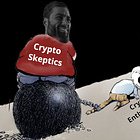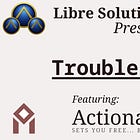These days, governments are no friend to people’s online freedom. This is explicitly clear in the financial realm. Central Bank Digital Currencies (CBDCs) have troubling implications for the future of financial transaction freedom. What many underestimate is that this is not the only threat to digital and financial liberty. Many had hoped that Bitcoin represented an opportunity to directly oppose the power of central banks and give people an independent currency to secure their own monetary sovereignty. As Bitcoin gained more traction, all manner of blockchain (and pseudo blockchain) projects were made under the assumption that distributed ledger technology would allow us to decentralize everything!
Anyone today would know that this revolution has not come to pass. Governments have secured more power over individuals than ever before. Cyberspace is on a trajectory to be entirely consolidated within a handful of massive tech corporations. In hindsight, it would seem that the only winning trend since the genesis block is in digitization. Suddenly, the idea of “decentralizing it all” began to rot under the stench of people’s lives becoming more governed by technology imposed on them.
The blockchain revolution didn’t fail because there weren’t enough smart programmers. Not because it didn’t receive enough attention or money either, but rather because the game changed in significant ways. Decentralized permission-less systems are fascinating tools, but at times, being right and early can be just as bad as being wrong. While Big Tech bought time for the censorship apparatus to catch up with modern technologies, the cyber resistance was being manipulated out of the game.
The wolf in sheep’s clothing
For all the sophisticated debate about double-crosses, false flags, and secrecy. It seems that those with the courage and optimism to dream of a better world can sadly be very easy prey for those poised to take advantage of their pain. No matter the cause, no matter the debate, there are always social engineers primed to fleece those who want to commit their time, attention, and resources to a cause.
“The nine most terrifying words in the English language are ‘I’m from the government and I’m here to help.’”
President Ronald Reagan
It seems that Ronald Reagan had quite the blind spot, and understated things considerably. These days it would be more apt to say the four words “I’m here to help!” alone are the most terrifying to discerning ears. This is not because everyone willing to help has bad intentions. It is due to the unfortunate fact that those who have the best reach are very often those who profit off the chaos. The many who truly mean well, tend to recognize the sheer size and scope of complicated problems, and recognize that genuine solutions themselves are no simple affair.
It is ironic that in 2024, when providing online services to everyone in your life is vastly more inexpensive and useful than a mere decade ago, so-called ’techies’ are still hopelessly dependent on digital saviors to come to their rescue. While the technocracy consolidated digital infrastructure further under direct control, “cyber rebels” were spending all of their cognitive might building “dApps” for a future that would never come. Blockchain enthusiasts incorrectly assumed that there was, and always would be access to trusted (or at least neutral) computing to stage their revolution.
The radical solution to improving our technological future requires a radical rejection of present-day incentives. “Planting trees in who’s shade we’ll never sit” so to speak. Responding to Big Tech payouts, or participating in blockchain “pump and dumps” creates the very trap that people are eager to “opt-out” of. The truth that people are too ignorant or too selfish to see is that there is no “opting out” of technocracy. The total digital domination of the public is only something that can be opposed, not declined.
Tokenized technocracy
Those who rightfully fear total control from governments will condescendingly tell people that “It’s Bitcoin or CBDC!” and if that doesn’t get enough fear they’ll sometimes chime in with “stay poor!”. By presenting the sum total of digital resistance to tyranny as a binary choice between “buy or die” one totally downplays the more critical fights. No cryptocurrency can itself re-balance control over digital infrastructure from the bottom-up. By shaming those not taking on a particular digital asset, they’re ultimately participating in furthering along the digitization of society along their financial interests.
Just as every corporation works to financially enrich it’s shareholders regardless of other concerns, every Proof of Stake (PoS) blockchain works the same way. Every wild and insane example of corporate abuse and fraud you can think of is perfectly compatible with PoS tokenized assets. To make matters worse, there are those who advocate for using this to seize control of the natural world. There is nothing radical or revolutionary itself of digitizing corporate ownership. In a time where corporations themselves have too much control over people’s digital lives, it’s wise to consider what the real impacts actually are.
It’s certainly possible that governments across the world will tolerate Bitcoin itself, so long as it doesn’t actually provide any privacy benefits to the people. Hodl’ers can rest easy that figures like Trump will be more than happy to enrich themselves off hyping the digital asset of today. Bitcoin advocates have long argued that buying into their ecosystem itself is an act of digital resistance to tyranny. This is perplexing because they’re generally not too concerned about the details. Buy through custodial services? Somehow, the fact that you’re defeating the purpose of using a digital self-custody asset, is of no importance. There’s not enough room in the system for people to truly use Bitcoin? Well just use lightning, and ignore the fact that it doesn’t actually work.
The misdirection
The point of the cryptocurrency misdirection was two-fold. By limiting the spectrum of innovation to higher levels, very few technologists were looking into more promising areas such as building devices from scratch and low-level programming. The real gains that have been made since the introduction of Bitcoin is those with technological ability learning to run and share their own services. By seizing control over the three primary resources in cyberspace: storage, bandwidth, and computing power, these cyber homesteaders started forging a path to actually decentralizing power over technology.
The second purpose of the ‘blockchain revolution’ was a powerful means of gas-lighting those who wanted to tackle digital control directly. By pumping the price of digital assets, techies would be inevitably mislead into believing that they are meaningfully effective at resisting technocracy. This was merely an illusion created by empty promises and individuals becoming wealthy enough to insulate themselves from many concerns.
Most concerning, the combination of these creates a very powerful force to blame the victim. Suddenly those who are unable (or unwilling) to participate in self-organizing (at best) financial schemes are deemed “stupid” or “lazy”, seemingly responsible for any and all abuses that follow. When digital dissidents realize the public is unable to make use of their innovations they’re supposed to regret their failure, not blame the public. Those of us with any expertise at all (be it technical, medical, financial, etc…) have an obligation to those around us to properly steward that expertise. That stewardship requires an understanding that not only is it not possible for everyone to understand all domains perfectly, but that given our limited time it wouldn’t be desirable either.
Reality check
Stop trying to focus on opting out of technocracy, redirect your attention to stopping technocracy. Our technical knowledge places the obligation on us to build a better digital future for those around us. By any indication available to those concerned, little if any progress is being made. Surveillance and censorship are still very well integrating into all areas of life.
In case you’re not sufficiently motivated I’ll share some statistics:
114 million adults in the USA have made mobile payments
72% of them are Gen X & Millennials
60 million people in the US use Apple Pay
In the US, teenagers spend an average of 4.8 hours on social media platforms every day.
89% of businesses forecast revenue growth with digital ID
42% of companies are ready to adopt digital ID
If blockchain technology was waiting in the wings to liberate us all, there would be much more encouraging figures. There are many potential reasons as to why we don’t have an independent decentralized financial system ready to oppose CBDC. What’s indisputably true, is that a wide variety of technological skills have withered away as people make use of more consolidated systems. The ideal way forward requires a dedicated approach to rediscovering and rebuilding up independent technical knowledge that isn’t being used to build top-down control systems.
Open source software is a great place to start, so long as one does not forget the deep pockets interested in steering that space. Cyber rebels need to come together and discuss what actionable steps can be made to make our digital future better today rather than obsessing over far-fetched schemes. Just as we need to call out and criticize bad actors in the technology space, our knowledge must be used to restrain our governments from abuses. With a solid vision for a better cyberspace, the tools we need to build become straight-forward and obvious. There is a phenomenal amount of opportunity in building a new path. It’s high time for techies to show the world what a real cyber rebellion would look like.











I posed myself the question this afternoon: what is my greatest fear? Reflexively the hideous word 'technocracy" was my first thought. But then the state's monopoly on violence, which has been a long-standing prime fear of mine, came back hot on the heels of technocracy, because were it not for its unmatchable capacity for violence, it would not be able to impose technocracy on us, or if it did, we'd soon wreck it and them as well.
I think I've said it before, or similar, and even if I have, I'll say it again: I believe your commentary is some of the most perceptive, and most important given that technocracy will be all pervasive and all encompassing. Whether it succeeds or not, almost certainly we'll all have to deal with it in one way or another, or many.
"If blockchain technology was waiting in the wings to liberate us all, there would be much more encouraging figures."
There really seems one and only one sensible application for blockchain, and that application is inextricably tied to Bitcoin.
A quote from Saifedean Ammous' book of 2018, The Bitcoin Standard:
"For any trusted third party carrying out payments, trading, or record-keeping, the blockchain is an extremely costly and inefficient technology to utilize. A non‐Bitcoin blockchain combines the worst of both worlds: the cumbersome structure of the blockchain with the cost and security risk of trusted third parties. It is no wonder that eight years after its invention, blockchain technology has not yet managed to break through in a successful, ready‐for‐market commercial application other than the one for which it was specifically designed: Bitcoin."
You're reading my mind again, Gabriel. Keep that up! I've been ruminating on an episode called Flim Flam Scams looking at all the ways we're left vulnerable and end up blaming ourselves for being fools, rather than blaming the system that fails to protect us. I'll save the many stories for that.
Here's my take on the problem. When people use the word 'decentralize,' they think of the individual level. But that's clearly not possible. To set up a global network of individuals is centralized by definition, even if that's by a technology that's programmed by someone. The Intranet that I'd like to see is one that exists only in my commonwealth of 10-30K people and doesn't allow commercial sites. The responsibility of that Intranet is to protect its members freedom of information and communication while networking with other Intranets to identify scams.
When scams are identified, their commonwealth location is notified and given the opportunity to remedy the situation. If repeated scams come from there, and the surrounding commonwealths, Intranets may choose to ban the whole region or prevent any financial transactions.
Things are changing so fast, I don't think there's any way to protect ourselves as individuals. And do you want to be the last person with a lifeboat when the Titanic sinks? What a horrible way to live. I agree that we need to change the systems, economic and technological. Thanks, Gabe.